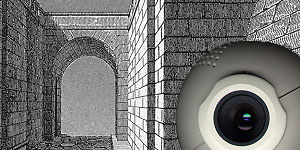


Clear and Present Danger
In 1948, when George Orwell published his novel 1984, there were no computers to speak of---and he wasn't much of a technologist to begin with. But now Big Brother can hire all the technologists he wants. Despite recent setbacks in a few advanced countries, all police and spy agencies keep pushing for various anti-privacy laws, arguing that knowing everything about everybody is the only way for them to fight crime, terrorism, and subversion.Well, they're right. But some fear that with such a system in place, nothing can protect us from unscrupulous government agents. Or perhaps even a police state. On the other hand, privacy as we in advanced countries understand it today is a modern invention. A hundred years ago nobody worried about privacy---protection against highway- men was more important. Having the sheriff know that bandits were nearby was far more important than having him know what kind ofshoes we buy.
Today, however, those of us in advanced nations don't only have to worry about one potential Big Brother; there are already hundreds of thousands, perhaps millions, of Little Brothers. Now that electronic information about everyone and everything is publically available, surveillance has branched out from its ancient roots in spying and become the province of big business, organized crime, and every computer-literate person. Indeed, readily available electronic information has grown to such massive quantities that a whole new profession is arising---that of knowledge miner. That's why many businesses are so busily collecting information.
Many grocery stores, for example, are now trying to give their customers identification cards. Those cards seem to be like finding money in the street: use them and our grocery bills go down because we get special deals on certain items. In exchange, the store is gaining intimate knowledge about us and our shopping habits and, indirectly, everyone's shopping habits. Of course, if we use a credit or debit card the store doesn't have to give us a card of their own---we've already given them all that information for free. That information can be transmuted into money.
Nowadays, there are an estimated five million electronic information bases worldwide, and the total volume of electronic information is doubling roughly every two years. It has already surpassed the amount of information stored on paper. By making such huge amounts of information available cheaply and quickly, and by letting anyone analyze that information, computers let us combine lots of previously useless information in new ways.
If you give me your phone number today, for example, you may also be giving me your address. In the old days I could only derive one from the other if I had lots of money. I would have had to pay an army to enter all the telephone numbers and addresses, buy high-priced computers, and hire even pricier programmers to organize and access that mass of information. Nobody but the ultrarich could do that; and they didn't need to do it because they could just hire detectives to follow you around.
But today, for just eighty dollars, I can buy two computer disks listing ninety million American homes and businesses. As soon as I know your telephone number, I also know your address. And the technology is getting cheaper by the minute.
If I know what I'm doing, here's how it might work today when you call me. Immediately I might see a map of where you live, with the location narrowed down to something like a block, or even a floor of a building. Because census information is already electronically available, I might get a feel for your neighborhood, your income level, perhaps your credit history, and so on. If motor vehicle information bases are tied in, I might learn your license plate number and registration, insurance premiums, and rate of renewal. Mail order companies and retail stores pool and sell their information; so I might also know about your annual expenditures, catalogs you receive, how much you spend on groceries, and all sorts of other things. You can learn a lot just by watching what people buy and where they live.
Perhaps you don't mind one person knowing your credit history; another knowing where you live; a third knowing when you're away on vacation; or a fourth knowing whether you're female, live alone, are elderly or ill, have ever taken self-defense classes, own a gun or dog, or have a home protection system. But if anyone can easily learn all those things just from your license number, credit card number, social security number---or even your phone number---you're simply fruit ripe for the picking.